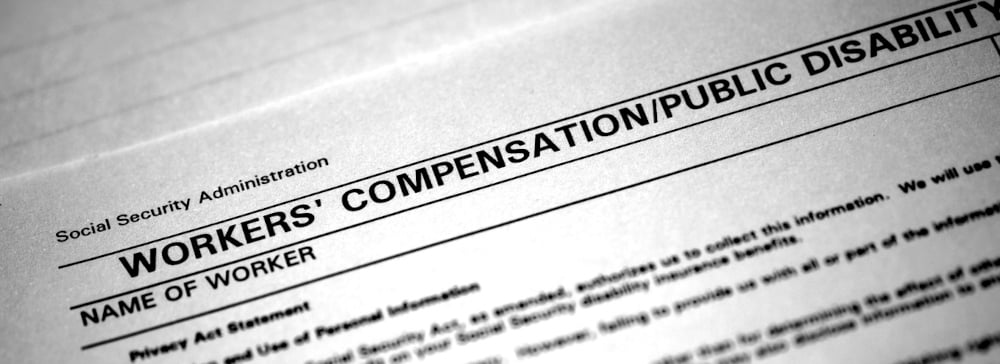Table of Contents
If you suffer an on-the-job injury, your health insurance does not cover your medical expenses or rehabilitation. Instead, you must rely on workers’ compensation coverage. Unfortunately, your employer or their insurance carrier may dispute your workers’ compensation claim.
A West Palm Beach workers’ compensation lawyer at Kogan & DiSalvo can help you receive the workers’ compensation coverage you deserve.

Workers compensation is an insurance system providing medical benefits and wage replacement to employees with work-related injuries or illnesses.
The workers’ compensation system also benefits employers as workers cannot generally sue them for job-related injuries or illnesses.
Most Florida employers must provide workers’ compensation coverage for employees. In a non-construction industry, employers with four or more employees must carry workers’ comp.
In the construction industry, even one employee, including a business owner who is a member of an LLC or a corporate officer, triggers the workers’ comp requirement.
In the agricultural industry, employers must carry workers’ comp if they have six regular employees and/or 12 seasonal workers.

The first seven days of a disability are not compensated unless the employee is disabled for more than 21 days. Disability payments usually kick in on the eighth day. An employee should expect to receive their initial workers’ comp payment within 21 days.
While Florida is a no-fault state when it comes to workers’ comp insurance, there are exceptions to employee workers’ compensation eligibility. Those injured because they were intoxicated are ineligible for workers’ comp benefits. The same holds true for injuries incurred during a workplace fight if the injured party was an active participant in the incident.
Otherwise, even if you were partly at fault for the work-related injury, workers’ compensation should apply.

It is crucial to take the appropriate steps after a work injury. Failure to do so can jeopardize your benefits. Here is what to do:
Report the work-related accident or injury to your supervisor as soon as possible. Do so in writing so the report is on the record. Although you have up to 30 days to notify your employer, it is best to do so promptly. Your employer can deny your claim if not notified within that timeframe.
Your employer must notify the insurance company within seven days of the reporting of the injury or illness. Within three days of receiving the notification, the insurer must send you a brochure outlining your rights.
Always seek medical attention after the injury. Go to the hospital in case of emergency. At the emergency room, tell the staff your injury took place on the job.
If the situation is not urgent, you must go to an employer-approved physician. Do not go to your own doctor for treatment.
Document all aspects of the incident. If able, take photos of the accident scene and your injuries. Obtain the names and contact information of any witnesses.
Keep good medical and related records. For instance, you can receive mileage reimbursement for visits to and from your authorized doctor and a pharmacy. Write down the dates and details of any healthcare provider appointments.
Following doctor’s orders is critical. Make sure to attend all scheduled appointments and follow your treatment plan. Not doing so will harm your workers’ comp claim.

Workers’ compensation offers medical, wage, disability, and death benefits:
Under workers’ comp, your employer authorizes medical treatment through its insurance carrier. Benefits include all normal and reasonable authorized medical care, including:
Lost wage compensation is an integral part of workers comp insurance. As of 2023, the maximum weekly compensation rate in Florida for work-related illnesses and injuries is $1,197.
Work-related injuries may lead to temporary or long-term disability. Disability benefits fall into four categories:
If the worker dies from a job-related accident or illness, their survivors may receive death benefits. A surviving spouse may receive up to 50 percent of the late worker’s average weekly wage.
If there is a surviving spouse and children, the spouse still receives 50 percent of the average weekly wages but can claim an additional 16.66 percent on the children’s behalf. The maximum amount of death benefit cannot exceed $150,000.

Workers’ compensation insurance disputes happen all too often. Insurers frequently try to deny valid claims. Your employer’s insurance carrier may allege that the injury is not work-related or a pre-existing condition or insist you are ready to go back to work even if your doctor states otherwise.
If you have a workers’ compensation insurance dispute or if your employer did not report your claim to the insurer, contact a West Palm Beach workers’ compensation attorney for assistance.

If you were injured while on the job and are experiencing issues concerning your workers’ comp benefits, you need the services of an experienced West Palm Beach personal injury lawyer at Kogan & DiSalvo.
Schedule a free, no-obligation consultation today. We protect your worker’s comp rights to medical benefits, compensation for lost wages, and disability payments.
If you are injured and unable to come to us,
our attorney will come to you - there is no charge for us to do so.